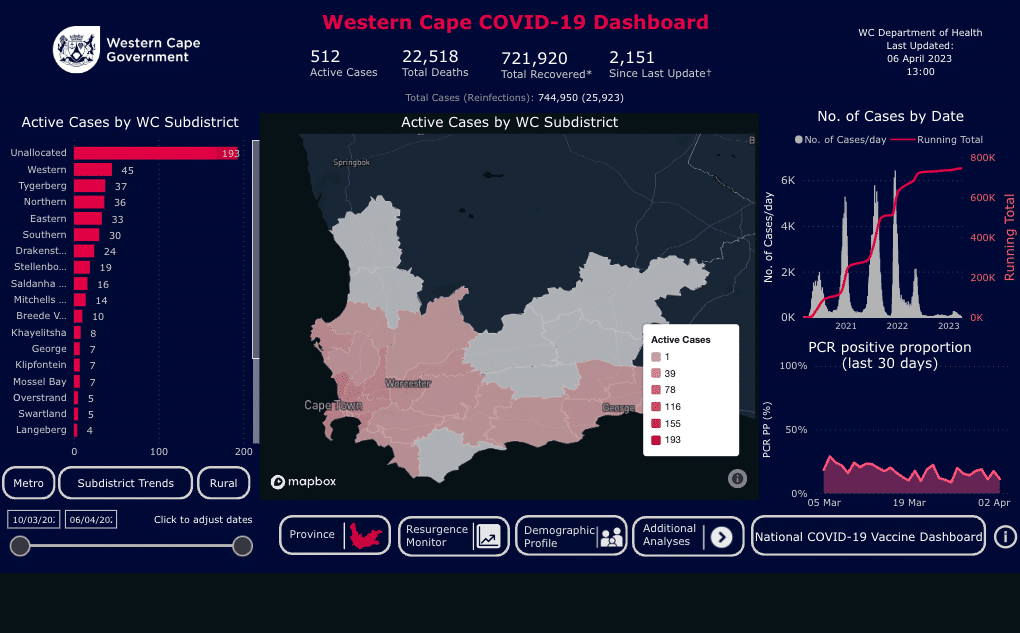Driver Project 6 - Addressing Critical Covid-19 Questions Through Research Using Linked Population Data (ACCORD)
To understand COVID-19 evolution and impact, also on pregnancy and chronic diseases, by applying a data science approach to health data to study the clinical epidemiology and evolution of a new SARS-CoV-2 variant, which emerged in South Africa.
Andrew Boulle and colleagues at the Western Cape Government Health Department and the University of Cape Town in South Africa used a data science approach applied to anonymised COVID-19 health data from the government health department including over one million tests and 60,000 hospital admissions, to study the clinical epidemiology and evolution of a new variant of SARS-CoV-2 that emerged in South Africa and the impact on patients with existing health conditions. They conducted a case-control study to determine the clinical severity of the variant and use a cross-sectional design to explore the evolution of viral load. They also analysed the impact of COVID-19 on pregnancy by evaluating birth weight and other birth outcomes, such as still births, and use death registries to determine mortality rates in patients with HIV, TB, and diabetes.
| Title | Journal | Date |
Type | Abstract |
|---|---|---|---|---|
| medRXiv | Oct 22 | Pre-print | Mortality occurred in 5.7% (95% CI: 5.3,6.0) of 17 831 first diagnosed infections. Higher mortality was associated with lower recent CD4, no evidence of ART collection, high or unknown recent viral load (among those with ART evidence), and recent first HIV evidence, differentially by age… | |
|
|
International Journal of Infectious Diseases | Nov 2022 | Publication | We aimed to compare clinical severity of Omicron BA.4/BA.5 infection with BA.1 and earlier variant infections among laboratory-confirmed SARS-CoV-2 cases in the Western Cape, South Africa, using timing of infection to infer the lineage/variant causing infection… |
|
Tropical Medicine and Public Health |
June 2022 | Publication | The objective was to compare COVID-19 outcomes in the Omicron-driven fourth wave with prior waves in the Western Cape, assess the contribution of undiagnosed prior infection to differences in outcomes in a context of high seroprevalence due to prior infection and determine whether protection against severe disease conferred by prior infection and/or vaccination was maintained… | |
|
|
International Journal of Infectious Diseases |
May 2022 | Publication | At present, it is unclear whether the extent of reduced risk of severe disease seen with SARS-Cov-2 Omicron variant infection is caused by a decrease in variant virulence or by higher levels of population immunity… |
|
Journal of Virological Methods |
Jan 2022 | Publication | Routine SARS-CoV-2 surveillance in the Western Cape region of South Africa (January-August 2021) found a reduced RT-PCR amplification efficiency of the RdRp-gene target of the Seegene, Allplex 2019-nCoV diagnostic assay from June 2021 when detecting the Delta variant… | |
| Gates Open Research | Aug 2022 | Publication | A novel proxy for the Delta variant, RNA-dependent RNA polymerase target delay in the Seegene Allplex™ 2019-nCoV PCR assay, was associated with higher mortality (adjusted Odds Ratio 1.45 [95%CI 1.13-1.86]), compared to presumptive Beta infection, in the Western Cape, South Africa (April-July 2021). Prior diagnosed infection and vaccination were protective. |
| Title |
Description |
|
| COVID-19 cases dashboard |
Accessibility of outputs to the general public was facilitated by a public-facing dashboard which pre-dated the ACCORD project
|

|


